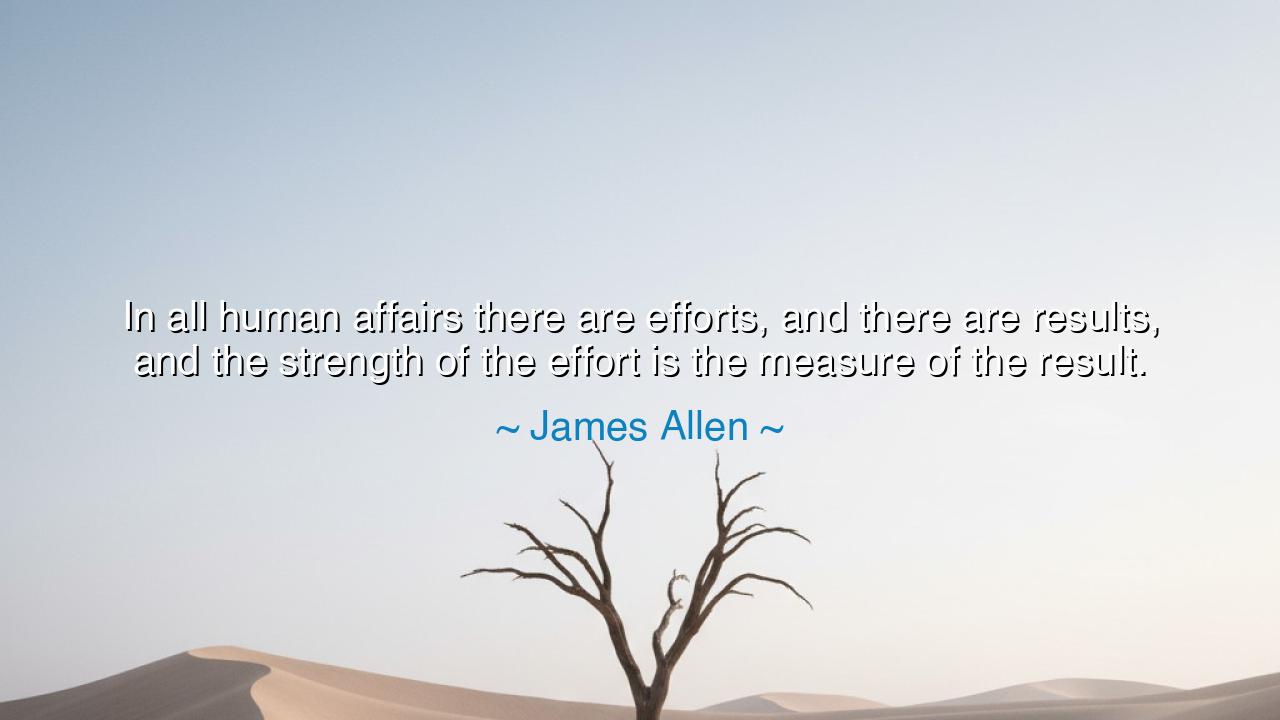
In all human affairs there are efforts, and there are results
In all human affairs there are efforts, and there are results, and the strength of the effort is the measure of the result.






Hear the words of James Allen, philosopher of the inner life and author of As a Man Thinketh: “In all human affairs there are efforts, and there are results, and the strength of the effort is the measure of the result.” In this utterance lies a timeless law, simple to the ear yet heavy with truth. It is the law of cause and effect, written not only in the stars, but also in the sweat of human brows and the striving of human hearts. For nothing arises without labor, and no dream becomes flesh without the strength of the effort behind it.
Allen spoke in an age when industrial smoke darkened the skies of Europe, when men and women sought not only bread but meaning. He taught that the universe does not reward idleness, nor does it grant greatness to the wishful. Only those whose effort is steady and strong reap results worthy of endurance. Just as the farmer who tills the field with vigor gathers an abundant harvest, so the soul that pours its whole being into its work reaps the fruit of victory.
History gives us countless examples of this law. Consider Thomas Edison, whose search for the electric light required not one attempt but thousands. Many would have surrendered to despair, but Edison declared, “I have not failed. I’ve just found 10,000 ways that won’t work.” It was the strength of his effort, multiplied day after day, that yielded the glowing bulb which changed the world. The result was great because the effort behind it was mighty.
So too with nations. When Winston Churchill steeled Britain in the darkest days of war, he reminded his people that only effort without rest could ensure survival. “Blood, toil, tears, and sweat” were the price demanded, and it was precisely because the people gave all their strength that they stood against the storm. The measure of their result—the preservation of their nation—was equal to the strength of their effort.
Allen’s words also carry a warning. If results are meager, it is often because the effort was weak, half-hearted, or scattered. Many dream, but few labor as if their very lives depended on it. Many wish for greatness, but only those who burn with relentless persistence grasp it. This is not cruelty, but justice—the eternal law that what you sow, you shall also reap, and the measure of the sowing determines the harvest.
Understand then, O seeker: the world owes nothing to your desires, but it bends to your effort. Fortune smiles not on those who wait, but on those who strive. If your goal is noble, give it your whole strength; if your purpose is righteous, pursue it with fire. Half-effort yields half-results, but wholehearted effort moves mountains. The gods themselves honor those who labor with all their might.
Let this be your lesson: in your studies, in your craft, in your calling, pour yourself fully into the work. Do not count the hours, but count the heart you put into them. Pray if you must, hope if you must, but above all—work with strength. Then, when results appear, you will know they are the true measure of what you gave.
Thus is the teaching of James Allen: effort and result are bound as cause and effect, and the strength of the one is the measure of the other. Take this truth into your life, and let your efforts be mighty. For as the river carves the rock through ceaseless flow, so does unrelenting effort carve destiny itself.






AAdministratorAdministrator
Welcome, honored guests. Please leave a comment, we will respond soon